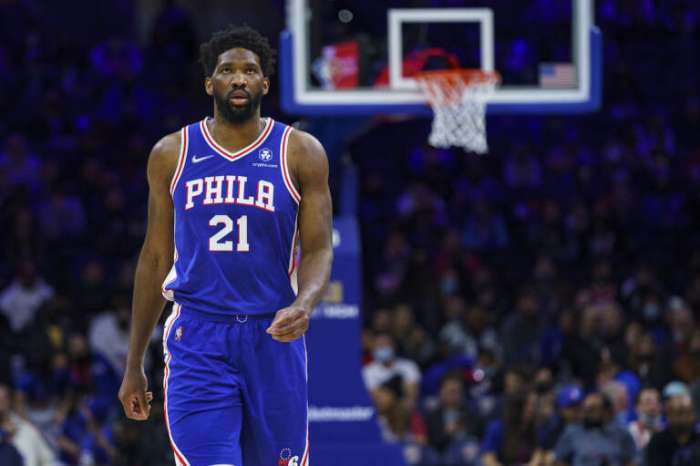Well, all the things considered, I suppose none of us should really be surprised by the outcome of last night’s game seven. The Beard in a big game was once again shorn. Doc had another team flatline under his supervision. And with all respect to Austin Reaves, Jayson Tatum continued to prove that perhaps he in fact is “him”. But most importantly, Joel Embiid remained mired in a very disturbing pattern of disappointing play in the games that his teams need him the most. Oh, how quickly a player turns from hero to goat.
The eye test tells you that this season’s MVP struggled to keep up with the Celtics as they pushed the pace. He looked indecisive and skittish in the post, made several mental errors, and his body language underscored a player that doesn’t seem capable of withstanding the emotional blows that are levied during the crucible of a seven-game series. But let’s eschew the eye-test for a minute and talk about the brass-tax of statistics.
While it would be hard for anyone in the postseason to replicate the monster numbers Embiid averaged during this past MVP campaign (33.1 points, 10.2 rebounds, 4.2 assists, and 54.8 field goal percentage), only Embiid’s rebounding numbers increase from his career averages (27.2, 11.2, 3.4, 50.1%) once the playoffs begins. In fact, Embiid’s postseason averages fall off across the board (24.0, 10.9, 2.4, 46%) from his career production. And if the true test of greatness is how well a player performs in the moments that matter the most, Embiid has failed that exam time and again. In nine games in which his team has faced elimination, Embiid is averaging just 22.2 points, 11.2 rebounds, and 2 assists, on a woeful 38.8 percent from the field.
To put this into greater perspective, of the top four finishers in MVP voting this season (Embiid, Jokic, Antetokounmpo, and Tatum) only Embiid doesn’t improve upon his career averages in the three major offensive categories when postseason play begins. Embiid is now also the only one of those four players to have not advanced beyond the conference semifinals. What is strange is that, as much as any of these players, Embiid’s style of play should flourish when the game slows down and becomes more physical in the postseason. Yet, the physicality seems to be problematic for Embiid, as his uncanny ability to hunt fouls as a means of production is stifled once the refs present a far more conservative whistle in the playoffs. As evidence, Embiid averaged 11.7 free throws per game this regular season, and 9.3 per game this postseason. This is further illustrated in Embiid’s shooting percentage in the restricted area which fell from 66.8% this past season, to 57.4% in these playoffs. Returning to the eye test, Embiid’s attempts at initiating contact that typically result in fouls instead became missed field goals. Ultimately resulting in Embiid looking less assertive and aggressive in those opportunities.
Yet, it is the less tangible component of the Embiid playoff under-performances that may be the most dismaying, his lack of leadership. The way he has comported himself in the face of adversity—a fundamental component to any hero’s journey—has not exactly inspired confidence. Where once Embiid cut a sympathetic figure in the face of a Kawhi Leonard send off, in recent playoff defeats the Sixers big man has been sulky, moody, and quick to avert any responsibility directed his way. The ends of both game six and game seven of this past Boston series showed a player incapable of withholding his frustrations, both physically on the court, as Embiid sulked in a still reachable game six and flat-out quit in the third quarter of game seven, but also off the court, where Embiid seems far more apt to bemoan his lack of support than to accept his own culpability in the Sixers repeated playoff failures.
So, what’s next for the reigning MVP and this Philadelphia franchise? Well, prospects aren’t good. The Sixers cap situation means that they almost surely must do everything in their power to run it back. Which is a depressing proposition as it was clear that the Sixer’s roster isn’t good enough as currently constructed. Moreso, if James Harden leaves as many expect, there is no means by which Philadelphia can replace his production through free agency. Separate of Tyrese Maxey, who the team must keep as an over-performing player on a cap-friendly contract under team control, the team has few assets to move because of the deal that brought Harden there in the first place.
While I fully expect Doc Rivers to be the scapegoat, I’m not sure that he was the problem, or that a new coach is the solution. In truth, the only fix is that the team invest in a seven-foot mirror and places it squarely in the center of the big man’s locker. Embiid must be better. Plain and simple. He can’t go from regular season world destroyer to just a very good playoff player. He must be the unequivocal leader by disposition as much as production.
Joel Embiid stood upon his highest personal peak just two weeks ago as he accepted his well-earned MVP trophy. And now rests in his greatest valley after another disappointing playoff exit. But greatness rises to the moment, and now, no moment calls for a more resolute expression of who Joel Embiid really is than what comes next. This again may just be a part of the journey, a mid-career Dirk phase that will eventually see Embiid atop the mountain. But for that to happen, he must first accept that it is his playoff missteps that sent him tumbling back down to the bottom of the precipice.
